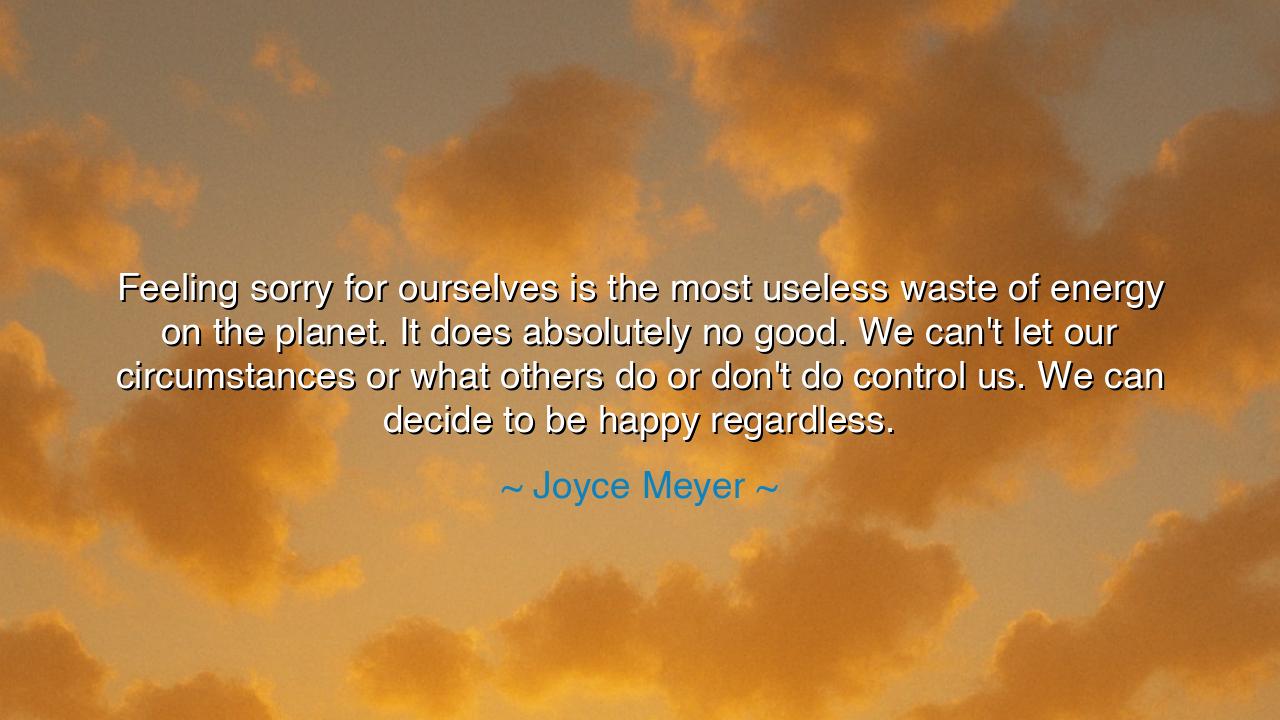
Feeling sorry for ourselves is the most useless waste of energy
Feeling sorry for ourselves is the most useless waste of energy on the planet. It does absolutely no good. We can't let our circumstances or what others do or don't do control us. We can decide to be happy regardless.






Hear the voice of Joyce Meyer, who speaks with fiery clarity: “Feeling sorry for ourselves is the most useless waste of energy on the planet. It does absolutely no good. We can't let our circumstances or what others do or don't do control us. We can decide to be happy regardless.” This truth, though plain, is hard for the heart to grasp, for man loves to cradle his wounds and rehearse his sorrows. Yet Meyer cuts through the fog of self-pity to reveal a higher path: the path of choice, where joy is not granted by fortune, but forged within the soul.
Self-pity is a thief, stealing time, energy, and life itself. It lures the weary spirit to dwell endlessly upon wrongs suffered, upon doors closed, upon betrayals endured. Yet in this dwelling, no progress is made, no healing comes. It is a mire, a swamp in which one sinks deeper the longer one lingers. Thus Meyer declares it useless, for it changes nothing—circumstances remain, yet the spirit weakens. True power lies not in sorrowing over what is, but in deciding how one shall respond.
The ancients knew this wisdom. The Stoic philosophers, led by Epictetus and Marcus Aurelius, taught that man cannot control what befalls him, but he can always control his response. Chains may bind the body, storms may batter the city, betrayal may pierce the heart—but none of these can dictate the soul’s inner choice. To yield to despair is to surrender sovereignty. To rise in joy despite adversity is to claim freedom that no tyrant nor misfortune can take.
Consider the tale of Viktor Frankl, a man cast into the Nazi death camps, stripped of family, freedom, and dignity. He had every reason to despair, every right to sink into self-pity. Yet he chose otherwise. He discovered that even in the most dehumanizing of conditions, man retains the freedom to choose his attitude. He wrote that those who found meaning—even in suffering—could endure with hope. Frankl’s choice to reject self-pity and embrace purpose is the living embodiment of Meyer’s wisdom: happiness is not circumstance but decision.
But the temptation is strong, for the heart whispers, “If only my situation changed, then I would be happy.” Yet Meyer rebukes this lie. Circumstances shift like waves, and to tie one’s happiness to them is to drift endlessly upon a restless sea. True joy is an anchor within. It is not dependent on what others do or fail to do. It is the sovereign choice to say: “Though the storm rages, I will not be moved; though betrayal cuts, I will not surrender my joy.”
What lesson, then, must you take? First, abandon the poison of self-pity. When wronged or wounded, acknowledge the pain but do not dwell there. Second, reclaim your power by remembering that no one and nothing controls your spirit but you. Others may harm you, but only you decide whether their actions shall dictate your happiness. And third, make joy a deliberate act, not a passing mood. Choose it as a warrior chooses his armor.
Practical steps are clear: each day, when sorrow tempts you to self-pity, speak aloud: “This does not rule me.” Write three things for which you are grateful, even in hardship. Replace complaint with action, bitterness with purpose, sorrow with service. Help another who suffers, and you will find your own spirit strengthened. Each choice toward joy builds an inner fortress that no storm can tear down.
Thus remember Meyer’s timeless truth: self-pity is waste, but joy is power. Do not surrender your life to the weakness of complaint. Stand tall, claim the authority of your own spirit, and declare: “I will be happy, not because the world grants it, but because I choose it.” In this choice lies freedom, strength, and the unshakable peace of a soul that cannot be conquered.






AAdministratorAdministrator
Welcome, honored guests. Please leave a comment, we will respond soon